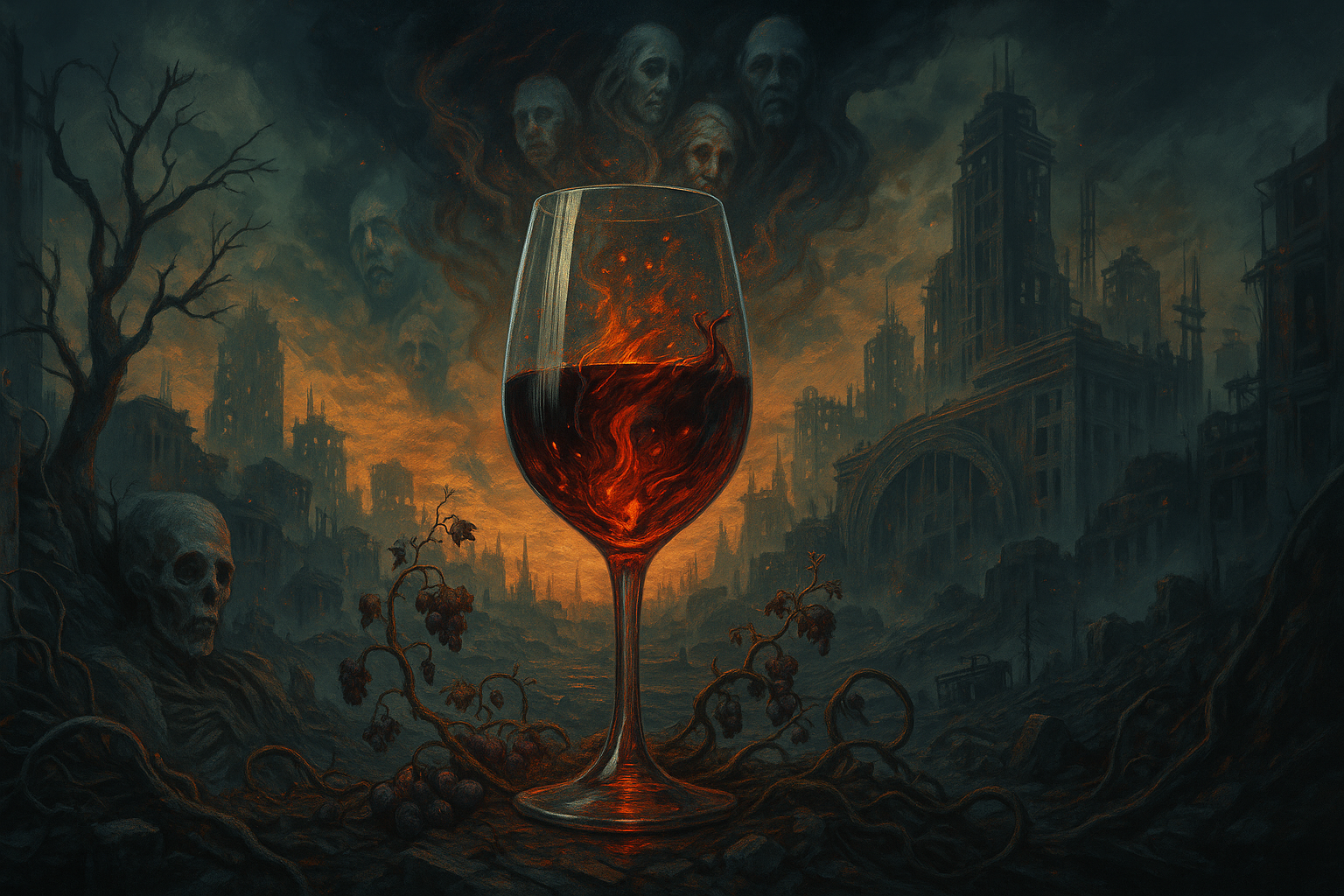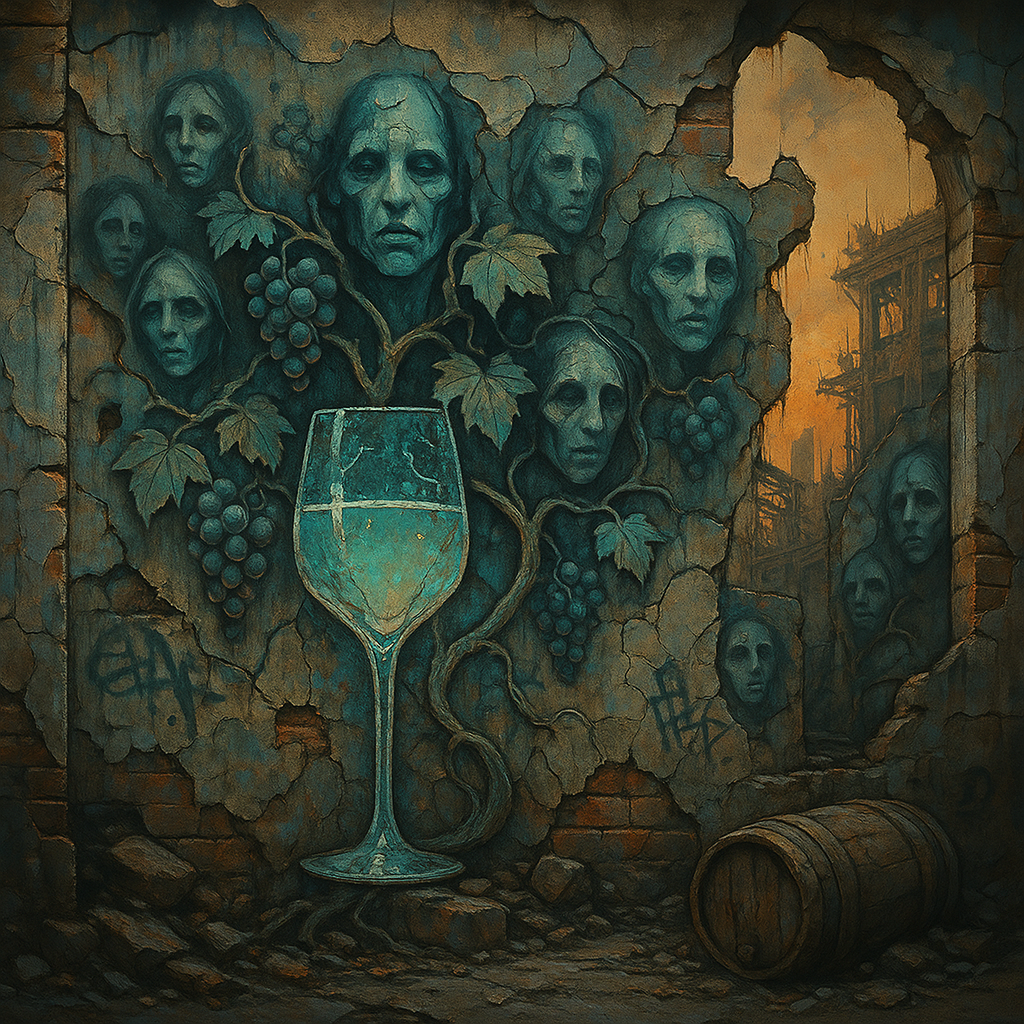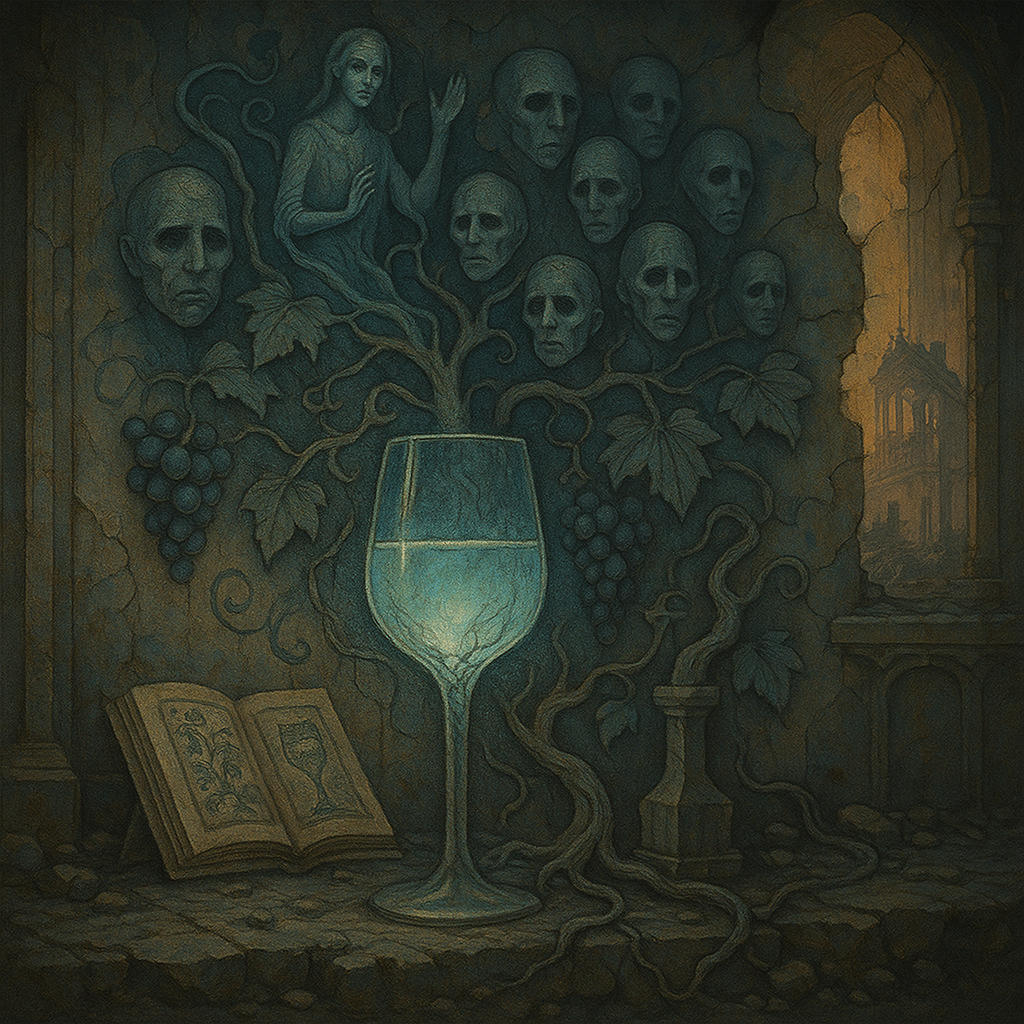Historical Basis
The myth of Echo Wine likely originates from pre-Fall attempts to preserve heritage wines from old world vineyards that were thought to hold curative or spiritual qualities. Records from the last decades before the Fall mention “memory vintages,” wines distilled from rare, ancient grape cultivars grown in estates now reduced to ruins. Some survivors found partially preserved casks in the wreckage of a noble estate near what is now Camp Hope. Though the wine itself was never tested or consumed widely—most samples spoiled or became toxic—the story of a mystical wine that could connect drinkers to memories was passed down by early settlers and religious figures. Subtle chemical properties of the ruined vineyards’ soil, contaminated by unique mineral deposits and organic decay, may cause mild hallucinogenic effects in fermented fruit, providing a faint scientific basis for the myth.
The earliest known written account dates to roughly 35 SE, about 22 years after Camp Hope was established. This was during the era when early settlers were beginning to collect fragments of pre-Fall knowledge and oral traditions to preserve what little history remained. The myth appears in a tattered manuscript titled Whispers from the Vine — a compilation of folk tales, survivor accounts, and fragments of pre-Fall alchemical texts discovered in the ruins of a nearby noble estate.
The text describes the mysterious vineyards and the strange sensory effects attributed to the wine made from the old grapes, emphasizing its ability to “reach into the souls of the lost.” Scholars debate whether this early manuscript was meant as allegory or based on real experiences, but it became the foundation for all later references to Echo Wine.
The events the Echo Wine myth describes are said to have occurred shortly before and during the Fall, roughly between 0 SE and 10 SE.
This was the final decade before and during the collapse of civilization, when the old world vineyards still thrived but were already beginning to be abandoned or ruined. According to legend, the wine was crafted from the last harvests, as people desperately sought remedies or spiritual solace amid the growing chaos. The “tears of the lost” watering the grapes symbolize the immense suffering and loss experienced during this era.
By the time Camp Hope was founded in 13 SE, the vineyards were mostly overgrown or destroyed, and the wine itself became a fading memory—preserved only in stories and myths passed down by survivors and their descendants.
You lift the slender glass to your lips, the faint chime of crystal whispering as it moves. The liquid inside shimmers with a pale, translucent glow—echo wine, a rare vintage said to hold the memory of voices long past. As the first drop touches your tongue, a cool rush spreads, smooth and fleeting, like a breath caught between moments. Flavors ripple—faint traces of aged wood, soft fruit, and something elusive, almost like a whispered secret just beyond reach. The wine lingers, carrying a strange echo of distant laughter and forgotten conversations, as if the glass itself remembers the stories it has held.
With each swallow, you feel the world around you soften, colors dim slightly, and the air thicken with a gentle hum, like voices folding over themselves in a quiet reverie. It’s as though the wine unspools threads of time, weaving a subtle connection between now and then. You savor the sensation, aware that with every sip, you’re not just drinking a beverage—you’re drinking echoes, fragments of the past folded into the present, and for a fleeting moment, you are part of that endless reverberation.
Spread
The legend of Echo Wine is well known among the factions of Camp Hope but remains elusive and somewhat forbidden knowledge. The Church of Hope discourages its consumption, fearing it might open doors to corruption or false visions, while The Doctors cautiously study references to it in old texts. Among the Solstice Syndicate and certain fringe cults, Echo Wine is sought as a gateway to forbidden knowledge or altered states. Stories about it are whispered more than told aloud, regarded as an apocryphal legend that only those “cursed” or “blessed” by the wine’s visions truly understand. Most of Camp Hope’s population has only heard fragments or rumors, often distorted by fear or reverence.
Variations & Mutation
Over time, the story of Echo Wine has splintered into many versions. Some say the wine grants prophetic visions but at the cost of the drinker’s sanity or soul. Others believe it connects one directly to the spirits of the Fall’s dead, allowing conversations with ancestors or even the original “Others.” A darker strain of the myth claims the wine is brewed using grapes soaked in the blood of an Awakened, granting power but sealing one’s fate to corruption. Religious factions tend to frame the wine as a temptation sent to test faith, while rogue Engineers speculate it contains traces of nanotech or bioweapon contaminants that interact with brain chemistry. These diverse interpretations reflect the fractured knowledge and attitudes toward forbidden history and the unknown in Camp Hope.
They say a glass of Echo Wine doesn’t just carry flavor—it carries remembrance. Every sip is a communion with those who vanished, every vine a root tangled in memory, every bottle a whispered elegy sealed in glass.
Cultural Reception
The Church of Hope views Echo Wine as a dangerous, blasphemous relic of the pre-Fall world—something that tempts mortals to defy divine will by seeking forbidden knowledge. The Doctors see it as an intriguing but hazardous artifact to be researched for clues about the past and possible medical benefits or neurological effects. The Farmers Guild regards it as a strange superstition with little relevance to their daily lives, while the Solstice Syndicate exploits the myth to sell bootlegged batches as an illicit narcotic with mysterious side effects. Among “Others” and the Awakened, Echo Wine sometimes takes on a cult-like status as a symbol of transcendence, a bridge between human and corrupted existence.
In Literature
Echo Wine has inspired several works of poetry and prose in Camp Hope’s growing body of literature. A well-known collection titled Whispers of the Forgotten includes poems allegedly composed under the influence of the wine, describing ethereal voices and visions of the pre-Fall world. Some scholars debate the authenticity of these works, but they remain popular among intellectuals and mystics. Occasionally, sermons or philosophical tracts reference Echo Wine as a metaphor for the dangers of knowledge and the allure of the unknown.
In Art
Echo Wine holds a revered place in the art of the post-Fall world, not only as a subject but as a symbol—of remembrance, of loss, and of the strange persistence of the soul. In the old wine cellars of Camp Hope, fragmented murals bloom across crumbling stone walls, depicting ghostly faces emerging from grapevines, their expressions serene, mournful, or transfixed. These haunting figures represent the dead not as gone, but as absorbed—preserved in the roots of the vine and the liquid of the wine itself. Artists render the vines with sinewy precision, often twisting into human shapes or echoing the curves of whispered speech, suggesting that to drink Echo Wine is to partake in memory itself.
Across Camp Hope, Echo Wine appears in sculpture, relief, and illuminated manuscripts, always as a threshold between the present and what has been lost. The glass is sometimes painted glowing softly in a dark room, as if lit from within by voices; other times it’s shown shattered, with spilled wine forming ghostlike silhouettes. In every piece, the wine becomes more than a beverage—it is depicted as a medium through which the dead still speak, the past still ripples, and the soul, for a moment, is made audible.






This is so spooky I love the idea of a drink bearing voices from the past, it was greatly presented and overall a beautiful article
Thank you so much!